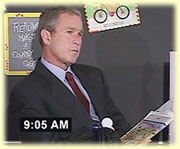|
Celsius 9-11
Michael Moore, Enhancer of Democracy
by Linda McQuaig
Michael Moore has been called a slimeball and an America-hater.
 And earlier this month, with his anti-Bush documentary breaking box office records, a CNN anchorwoman implied that Moore is nothing but an egomaniac, dismissively noting that he's "finally getting what he's wanted all along – attention." (An odd charge coming from someone whose career is built around getting TV face time.)
And earlier this month, with his anti-Bush documentary breaking box office records, a CNN anchorwoman implied that Moore is nothing but an egomaniac, dismissively noting that he's "finally getting what he's wanted all along – attention." (An odd charge coming from someone whose career is built around getting TV face time.)
But the lowest blow in the effort to discredit Michael Moore may be the attempt to compare his intriguing new film, Fahrenheit 9-11, to Mel Gibson's turgid, melodramatic The Passion of the Christ.
"Gibson and Moore – two sides of the same coin? Absolutely," wrote Andrew Sullivan in a commentary in Time magazine. "Both movies are ... deeply corrosive of the possibility of real debate and reason in our culture."
Corrosive?
One can criticize Michael Moore's methods, or challenge his facts, but it's just downright silly to accuse him of corroding the possibility of real debate.
Hell, the media shut down real debate long ago.
It is precisely because the debate has been so thoroughly corroded by the mainstream media – let's be honest, the extremist presidency of George W. Bush has been treated with kid gloves – that Moore's film is being so gratefully received by so many.
Fahrenheit 9-11 appears likely to actually generate debate among ordinary Americans who have otherwise been exposed to little more than nightly TV "news," in which America fights evildoers around the world. Moore questions the way the Bush administration has used 9-11 to justify the "war on terror." He asks what that war is really all about, starting with the fact it is being fought largely by poor people while rich, private interests benefit.
Moore follows army recruiters into depressed areas, where recruiting prospects are hot, and where almost everyone already has a friend or relative in Iraq. He then tries to get congressmen to sign up their children for war, and finds no takers, even though it was Congress that voted to go to war.
One scene shows Bush addressing a dinner of rich supporters, calling them "the haves and the have-mores."
Bush smirks: "Some people call you the elite. I call you my base."
This cozy relationship between Bush and the have-more crowd has been largely ignored by the media, which have let Bush present himself as a folksy guy. Moore puts this coziness in the spotlight.
He also shows moving footage of black members of Congress, mostly women, blocked in their efforts to protest cases of black disenfranchisement during the 2000 presidential election.
Moore Even Shows Bush on 9-11
 Then there's the unforgettable footage of Bush, after being informed that a second plane has hit the World Trade Center, sitting in a Florida classroom for seven minutes while schoolchildren read a story about a pet goat.
Then there's the unforgettable footage of Bush, after being informed that a second plane has hit the World Trade Center, sitting in a Florida classroom for seven minutes while schoolchildren read a story about a pet goat.
Stuck in that classroom, with cameras on him but no one to advise him what to do, Bush is lost, confused, and utterly useless to the nation.
Should warplanes be sent up? Should buildings be evacuated? Will the little goat find a happy home? Who knows what the man at the front of the class is thinking. But, with hijacked planes still flying over the country, it seems hard to imagine this guy is capable of taking charge of anything, let alone the defence of the free world.
Which raises the question: Why did the networks never show this footage? It's been available for years on the Internet, and it's at least as interesting as the footage of Saddam Hussein's mouth being examined after his capture – which the networks never tire of running.
 If the pet goat footage had been widely shown like the Saddam-mouth footage – or the career-ending footage of Howard Dean screaming after losing a Democratic primary – Bush would have had a lot more trouble presenting himself as a tough guy defending the United States from terrorists.
He would have forever been the guy who listened to a pet goat story while America burned – behavior that's at least as un-presidential as screaming exuberantly in the face of defeat in the primaries.
If the pet goat footage had been widely shown like the Saddam-mouth footage – or the career-ending footage of Howard Dean screaming after losing a Democratic primary – Bush would have had a lot more trouble presenting himself as a tough guy defending the United States from terrorists.
He would have forever been the guy who listened to a pet goat story while America burned – behavior that's at least as un-presidential as screaming exuberantly in the face of defeat in the primaries.
Despite efforts to stop him, Michael Moore has managed to take some vital issues and images out of obscurity and toss them into the mainstream.
This seems more impressive than what Mel Gibson has done – take a well-known story and retell it, only this time with a great deal more violence.
Gibson's film could be said to answer the question: What does a man look like after being beaten to a pulp for hours on end?
Moore's film, on the other hand, poses the more pressing question: What might the world look like after four more years of George Bush?
Linda McQuaig reports on culture and politics for the Toronto Star, where this article first appeared.
comment on this article >
back to top ^
|